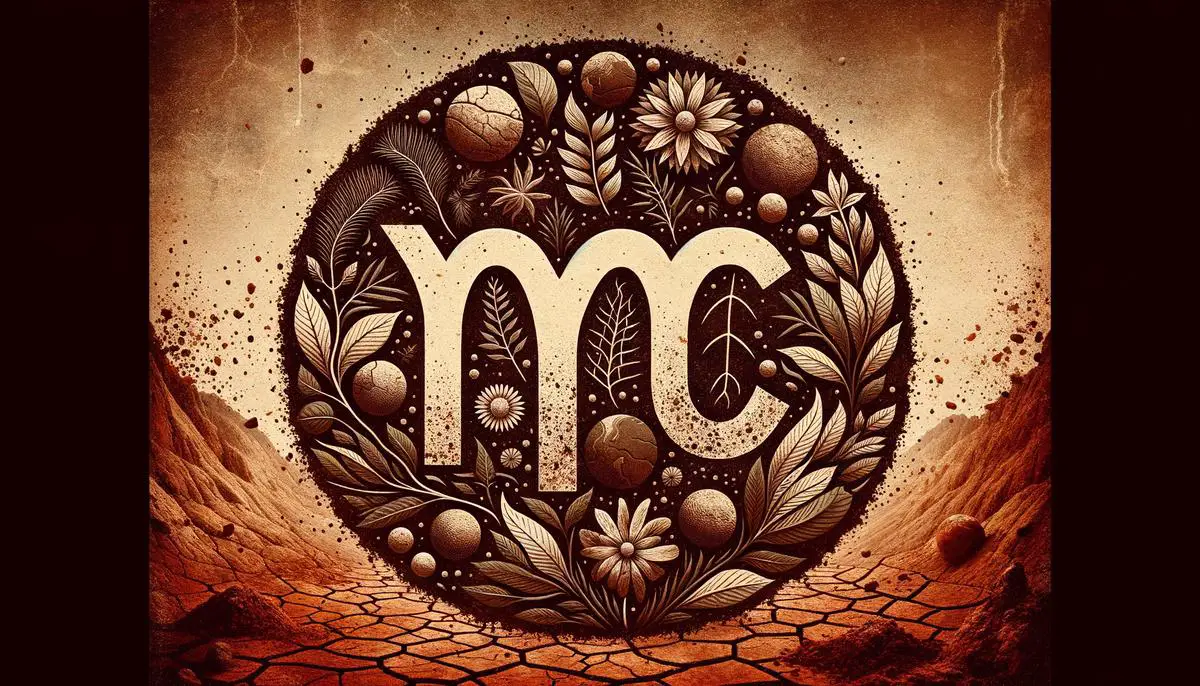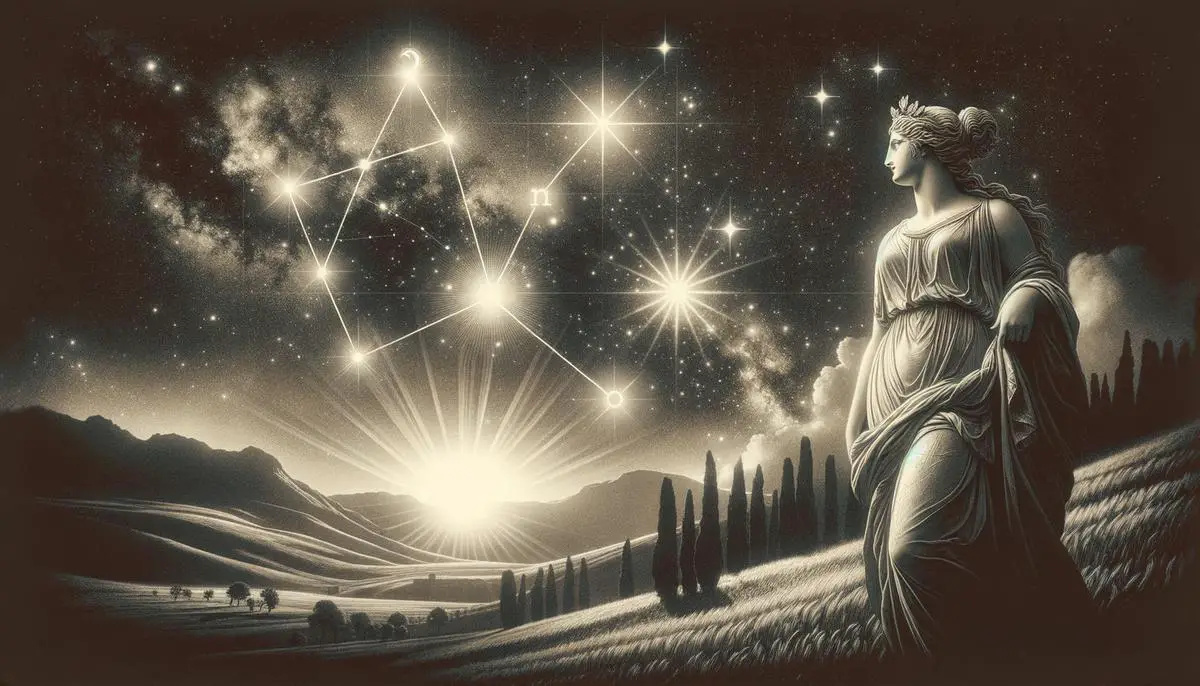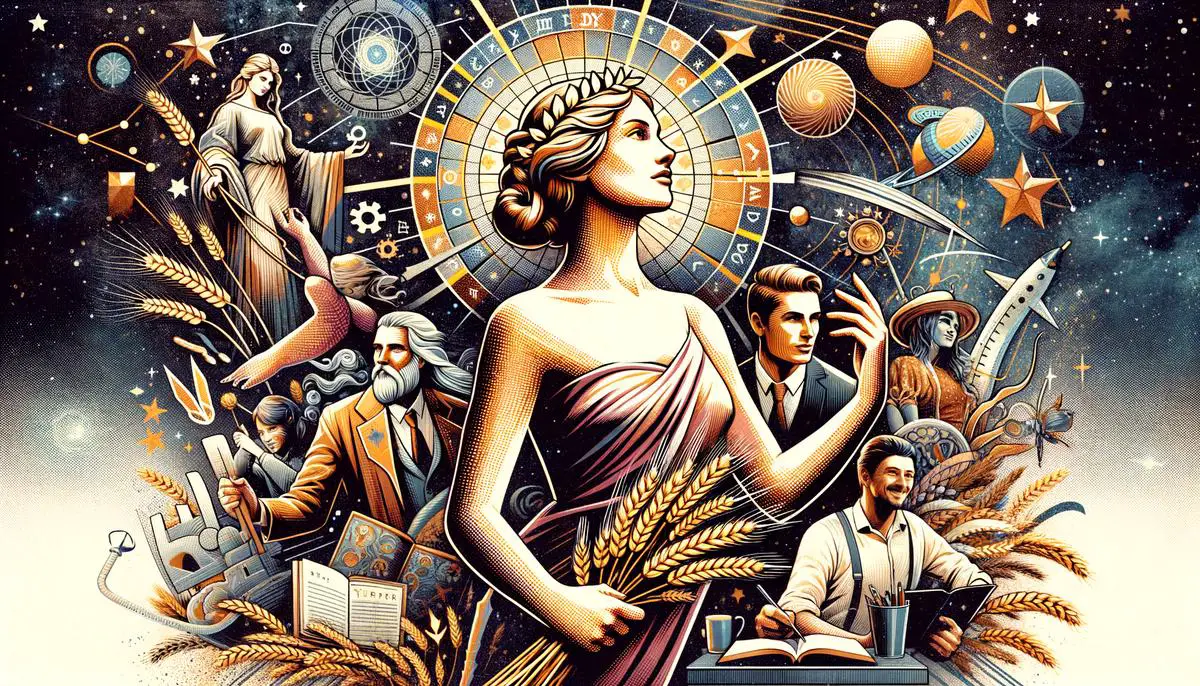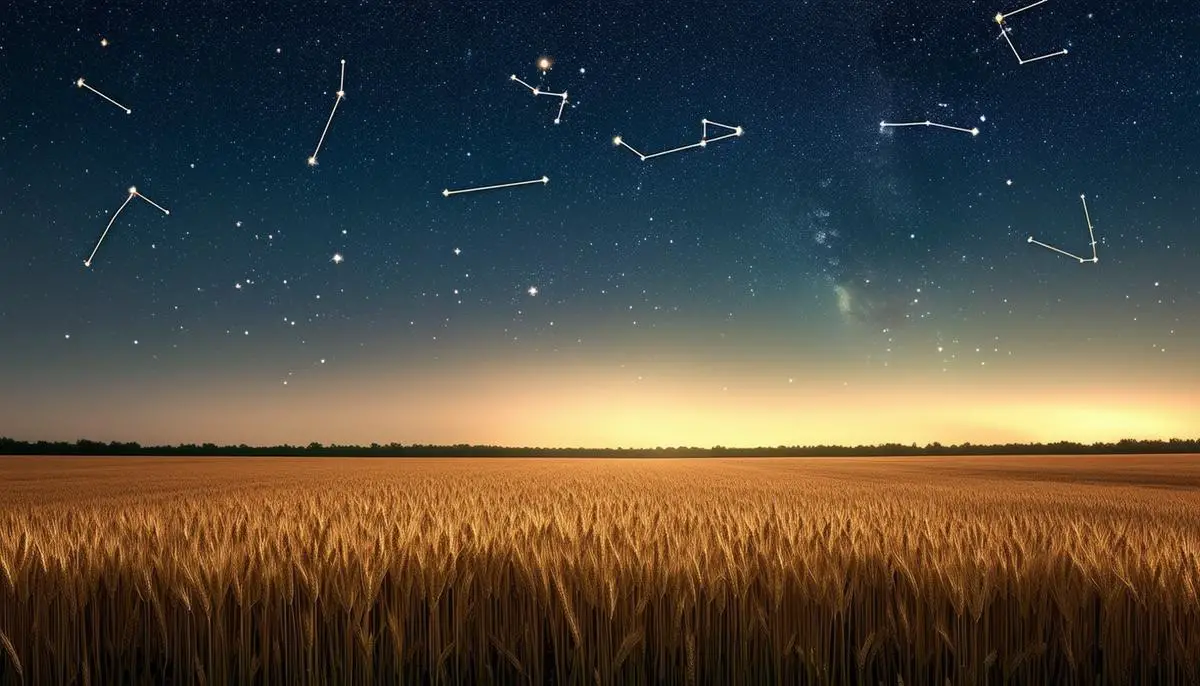Virgo's Astrological Significance
Virgo, represented by the Virgin, is a zodiac sign deeply associated with precision and service. As one of the Earth signs, Virgos are characterized by their steady and logical nature, serving as a cornerstone in their impressive aptitude for detailed and systematic thinking.
This attention to detail is further amplified by their ruling planet, Mercury, which supports efficient and precise communication. For Virgos, clarity is necessary. Thoughtful to the point where pondering over errors and how they can be perfected is routine, they constantly strive to refine everything and everyone around them.
Mercury, known for its influence over intellect and travel, brings out both the sharp-mindedness associated with Gemini, its fellow ruler, and the analytical precision emblematic of Virgo. Its energy encourages Virgos to consider thoughtfulness as an essential mode of operation, whether in speech, thought, or text.
Understanding Virgos through the lens of their earth element also highlights their renowned practicality. They engage with the world around them on a fundamentally tangible level, one that supports and requires a critical eye. They're not content with overblown or unrealistic expectations or presentations, often pushing back on ideas or endeavors they see as frivolous or excessively theoretical.
Tipping their scales towards a balanced life, Virgos strive for purity, practicality, and cleanliness by advocating a non-pompous lifestyle that materializes outputs with finesse. Such a disposition can make them occasionally appear too harsh or critical, especially when they highlight flaws in items or circumstances which others might overlook.
Despite any perceptions, they're arguably the most helpful zodiac sign, armed with an instinct to improve and serve diligently. Yet, their rapid mental processes and distancing from more vacuous engagements can occasionally make the well-wisher in them seem a bit cold or overly analytical.
Adding to these complex layers is Virgos' mutable nature allowing them to transition smoothly through life's different phases, adapt readily to new systems, or incorporate new factors into existing projects without fuss. It's evident that depth governs Virgo interaction—conservationism tethered to pragmatism and utility.

Virgo's Role in Mythology and Star Constellations
Historically, mythology paints Virgo as a key protagonist among the stars, beautifully incorporated into celestial folklore predominantly by Greek and Roman narrators. The constellation of Virgo, often synonymous with themes of purity and harvest, is vividly captured in these ancient cultures mostly through the figure of a maiden bearing an ear of corn, thus associating her directly with the nutritive aspects of agriculture central to these societies' survival and prosperity.
In Greek mythology, Virgo is most frequently identified with Demeter, the goddess of the harvest, whose daughter Persephone's abduction by Hades results in the seasonal cycles of growth and decay. In another interpretation, she is integrated as Astrea, the goddess of innocence and purity, who lived among humans during the Golden Age but retreated to the sky dismayed by the wickedness in the subsequent ages.
Meanwhile, the Romans aligned Virgo with their wheat goddess, Ceres, attributing both to serving nourishing connections between earthbound practices and celestial observances. This figure of a maiden not only symbolizes nurturing fertility but also aligns with themes of justice and moral wholesomeness through her civic counterpart, Justitia or Astraea—representations of integrity and equilibrium.
Astrological observations place Virgo in the night sky with Spica, a bright bluish star, symbolizing the sheaf of wheat held in the Virgin's left hand. Architecturally distinct as this luminary's light punctuates the assortment of galaxies trailing behind, ascribing to Virgo a magnitude that demands observer's reverence. Ancient farmers once relied upon Spica's heliacal rising as suggesting the timeline for specific agrarian achievements like crop planting or herd relocations. This tightly ties Virgo not only to mythical symbolism but practical applications too.
In terms of visibility, Virgo's stars remain prominent fixtures from both northern and southern hemispheres through the adjustment of countless seasons, proving a faithful chart in the ever-shifting celestial canvas. The constellation's presence in sky charts perpetuates its narrative immersion, extending Virgo's reach from mythic to scientific domains.
Through telescopic glimpses or naked-eye sightings, constellations like Virgo illuminate upon a planetary backdrop serving as significant cultural and astrological icons since time immemorial. The sociocultural imprint of Virgo's constellation, underscored by key stars such as Spica, bespeaks a profound artistry imbued by the celestial beings into human folklore—a cosmic dance between mythology and astronomy that sparks both imagination and observation. Today, these bright starlit connections remain sketched within modern star gazing domains, enriching our understanding of past civilizations profoundly attuned with celestial delineations.

Behavioral Traits and Compatibility
Patience, diligence, and a touch of modesty are trademarks of a typical Virgo, blending seamlessly into both their work environments and social arenas. Known for their scrupulous attention to detail and an inner drive to bring order from chaos, Virgos fit the image of the quintessential organized planners of the zodiac. Their practicality and methodical approach ensure that chaos is minimized, schedules are followed, and deadlines consistently met. This commitment to structure often crafts environments perfect for nurturing productivity, making Virgos invaluable in professional spheres.
Interpersonally, Virgos' proclivity for analysis and keen observation allows them to offer insightful advice and meaningful contributions. Yet, their straightforward approach in communicating truth can sometimes be misconstrued as critique rather than care; hence, while they're excellent at problem-solving, they might inadvertently ruffle feathers. In friendships, those born under this sign are incredibly loyal and dependable. They'll often be the ones arranging group outings, managing event details, or reminding friends of upcoming commitments—a testament to their reliable nature.
Romantically, this Earth sign seeks stability and loyalty above all. The characteristics credited to Virgos make them attentive and grounding partners. In love, they value intellect and purity of intention, often desiring long-term, meaningful relationships over fleeting romances. Their passion for detail may seem minor to some, yet it plays a significant role in creating harmony and deep connections with their partners.
When exploring the dynamics between Virgos and other zodiac signs, a fascinating relational world unfolds.
- Earth signs like Taurus and Capricorn resonate well with Virgos, sharing traits such as pragmatism and a preference for stability that makes for a practically harmonious relationship. Taurus, sharing in the practicality and a penchant for tranquility, often meshes well with the Virgin's methodological approach to life. This combination augurs well for long-lasting bonds filled with mutual respect and shared goals.
- Capricorn's ambitious spirit and Virgo's careful planning compliment each other perfectly. Together, these signs can build a structured space conducive to mutual growth and achievement. Their shared understanding of the value of hard work compounds their respect for one another, forging deep-rooted connections based on mutual admiration for discipline and perseverance.
- Pisces, however, stands out as the zodiac sign most opposite to Virgo. While at first glance this pairing might seem challenging due to Pisces' more whimsical and emotional approach compared to Virgo's grounded pragmatism, they often find common ground in their mutual desire for emotional depth. Pisces flows where Virgo plans, potentially creating a beautifully balanced relationship where each offers what the other lacks, thus fulfilling an essential emotional or pragmatic void in their partners' lives.
In professional settings, the pragmatic gap with Sagittarius can cause friction with Virgo's more planned approach. Sagittarius' spontaneous fire may at times feel restrictive under Virgo's methodical need. Conversely, shared analytical skills and logical proclivities often make collaborations with Gemini productive, although Virgos must be mindful of Gemini's volatile energy levels conflicting with their own steady pace.
Ultimately, the key to fostering successful relationships with a Virgo lies in understanding and respecting their deep-seated need for order and structure—whether in personal or professional domains. Approaching the reserved yet rich interior world of Virgos not merely as analytical constructs but as profound capacities for thoughtful, deep relationships ensures a holistic insight into their versatile personality.

Virgo in Modern Astrology and Popular Culture
Virgo's presence in modern astrology and popular culture offers a blend of reverence and stereotype, often shaping how those born under this sign are viewed by society at large. In the astrological community, Virgos are celebrated for their analytical minds and often depicted as the zodiac's organized, detail-oriented perfectionists. These traits are portrayed as both a blessing and a curse, depending on the perspective. On one hand, Virgos are acclaimed for their precision and reliability; on the other, they are sometimes caricatured as overly critical or compulsively tidy.
Popular media often amplifies these traits, sometimes overshooting into parody. Virgos are frequently presented as the fastidious friend or the hyper-organized, no-nonsense professional. TV shows and movies capitalize on this archetype to create characters who are either the stalwart backbone of a group or the nitpicky buzzkill, depending on the narrative need. This depiction, while entertaining, can both contribute to and detract from the true richness of the Virgo personality by foregrounding their more accessible traits over the deeper, more nuanced aspects of their character.
Virgos in the public eye have also played a significant role in shaping cultural perceptions of this sign. The precision often ascribed to Virgos can be seen in high-profile individuals like Beyoncé and Keanu Reeves, both of whom are noted for their exhaustive work ethic and attention to detail in their professions. Their success stories help to recast the Virgoan attention to detail as a formidable strength rather than a quirky obsession. At the same time, these personalities reveal the softer, more human side of Virgos—thoughtful, caring, and dedicated not just to their work but to making meaningful connections with their audiences.
Popular astrology platforms and social media have played crucial roles in both perpetuating and challenging Virgo stereotypes. These platforms have inadvertently become arenas where Virgo traits are discussed and interpreted among both amateur and professional astrologers. Here, Virgo's strengths are often celebrated—reliability, intellect, practical skills—at times glossing over their potential for warmth and deep emotional insight, which does not always neatly fit into the popular narrative.
Discussion forums and social media platforms sometimes propagate superficial interpretations, simplifying Virgo qualities into digestible, often humorous traits; memes about Virgo's love for lists, planning, and critical thinking abound. Yet, there is a counter-movement within these forums aiming to explore deeper into the Virgo psyche, discussing how their practicality reflects a profound inner life dedicated to finding order in chaos—not just for themselves, but for those they care about.
Thus, the portrayal of Virgo in modern astrology and popular culture bears dual tendencies: it highlights noticeable traits that align with easy narratives while underscoring a need for further exploration into their inherently complex nature. These portrayals dictate societal understanding might oversimplify but also encourage a more comprehensive appreciation of how Virgo's traits manifest in varying aspects of life—from personal relationships to professional environments.
The evolution of Virgo's portrayal proceeds then—an ongoing dialogue between representation and reality, as newer platforms facilitate broader discussions with opportunity to propagate respect beside endearing jest. This discussion mirrors cultural shifts towards acknowledging the nuanced realities beneath zodiac sign stereotypes, offering a more holistic view of Virgo and indeed all astral signs in contemporary astrological thought.

In essence, the portrayal of Virgo across various platforms highlights a zodiac sign that is integral to astrological discourse and pivotal in shaping cultural narratives. The precise nature of Virgos, while often simplified in popular culture, actually reflects a deeper commitment to order and service, making them indispensable in both personal growth and societal development.
- Orion R. Astrology: The Celestial Mirror. 2nd ed. New York, NY: Skyward Publications; 2017.
- Ptolemy C. Tetrabiblos. Translated by Ashmand JM. Chicago, IL: Aries Press; 1936.
- Sachs A. The Babylonian Horoscopes. Transactions of the American Philosophical Society. 1952;43(1):1-82. doi:10.2307/1005641
- Scofield B. The Zodiac by Degrees: Second Edition. 2nd ed. San Diego, CA: ACS Publications; 2014.
- Tester J. A History of Western Astrology. Woodbridge, UK: Boydell Press; 1987.
![]()
